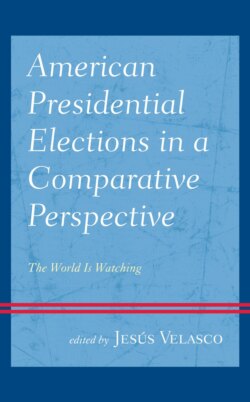Читать книгу American Presidential Elections in a Comparative Perspective - Группа авторов - Страница 26
На сайте Литреса книга снята с продажи.
THE TRUMP PHENOMENON
ОглавлениеIn contrast to Hillary Clinton, the Republican candidate Donald Trump not only received much more attention in China, but also generated more heated debate and divisions between the Chinese. While ordinary Chinese citizens were generally fascinated by Trump’s unexpected rise and his politically incorrect style of campaigning, there were actually mixed feelings and divided opinions about him as a presidential candidate. According to an online survey conducted by an influential Chinese website, 54 percent of the 3,300 respondents interviewed were in favor of Trump, while 46 percent of them disliked him. When asked about the impact of a Trump presidency on China, 45.6 percent believed Trump would have a positive impact, while 54.4 percent were more pessimistic about the prospect.28
To account for the Chinese public’s mixed sentiments about Trump, Tang Shiping, a famous Chinese scholar of international politics, proposed six factors that earned Trump so many supporters in China.29 First, he argues that some Trump supporters are motivationally biased, because they hope Trump’s victory would validate their predictions about the election. Second, he contends that some Chinese are rooting for Trump because they expect more “fun” and surprises from a Trump presidency versus a Clinton presidency. Third, some Chinese Trump supporters actually identify with Trump’s political style, and are even impressed with his boldness and political incorrectness. Fourth, some Chinese hope to see a Trump presidency because they believe Clinton would adopt tough measures against China while Trump might be easier to cope with, as he is supposedly business-minded. Fifth, a few Chinese cheer for Trump’s success because they secretly wish for “a worse president” than George W. Bush, so that China could have another four or even eight years of “strategic opportunity” while America was preoccupied with its own mess. Lastly, many people in China support Trump not because they genuinely like him but simply want him to succeed at the expense of the American democratic system. Tang also points out that Hillary Clinton is in fact a flawed politician unsympathetic with the American people’s moods for change. It is interesting to note that, on the other hand, many Chinese people despise Trump and oppose his candidacy either because they were turned off by Trump’s disparaging remarks about women and religion or were offended by his rhetoric on China.30
While ordinary Chinese citizens were primarily interested in the drama and entertainment that Trump brought, China’s experts on the United States took the Trump phenomenon more seriously as they tried to understand and interpret the causes and significance behind Trump’s surprising success. Diao Daming points out that the rise of Trump reflected recurrent themes in US history, such as nativism, anti-intellectualism, and paranoid-style politics. He also contends that the Trump phenomenon was a Frankenstein of the current US political system’s own making, as Trump’s primary wins had been precipitated in no small way by the institutional design of America’s primary system and the GOP’s political ecology.31 Zhou Qi and Fu Suixin share similar views as they argue that rising economic inequality in the new American “Gilded Age” contributed enormously to Trump’s popularity, while they caution against the voters’ choice of Trump’s populist and conservative ideas as the suitable solution to America’s political and economic dilemmas.32
According to Da Wei, the director of the Institute of American Studies at the China Institutes of Contemporary International Relations, the Trump phenomenon reflected “real problems” facing the United States, as well as political and economic difficulties shared by capitalist nations worldwide.33
In his opinion, fundamental institutional reforms would be the only solution to the United States’ problems. He argued that both Obama’s victory in 2008 and Trump’s rise in 2016 had promised the American people reform, the only difference being that Americans have now lost their patience with the Washington elites and would take a risk with an outsider riding on populist sentiments. Unlike the majority of Chinese experts, Da Wei acknowledged some positive elements of the Trump movement, as he claimed,
The Trump phenomenon is commendable in the sense that it represented a selfexposure of the many problems facing America’s capitalist system; it was also the second attempt after 2008 for the United States to carry out institutional reforms. The exposure of its own problems and the efforts for self-renewal are precisely the fundamental driving forces that have maintained the United States’ long-term competitiveness.
Meanwhile, many Chinese scholars agree with the notion that the Trump phenomenon is not unique to the United States, but representative of a larger global trend, as they are inclined to place the Trump phenomenon and Brexit within a similar analytical framework. For example, Huang Renwei argued strongly for a connection between the US election and the Brexit movement as both incidents reflected new paradoxes and conflicts that have emerged because of increasing global disequilibrium, both politically and economically.34 Another Chinese scholar Wang Hongzhi drew an interesting analogy between Donald Trump and Ke Wenzhe, a Taiwanese physician-turnedpolitician who became the mayor of Taipei in 2014. Wang contends that Trump and Ke share many similarities, as they were both political outsiders, both good at manipulating the public sentiments; their rise reflected rising distrust of the political elites.35
